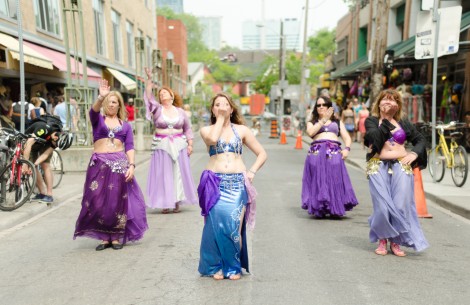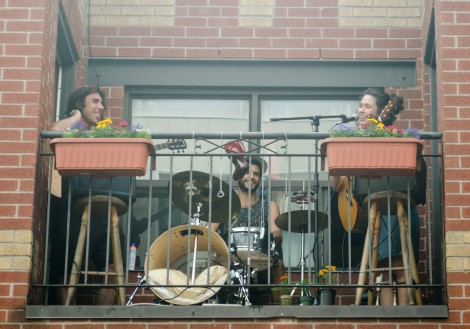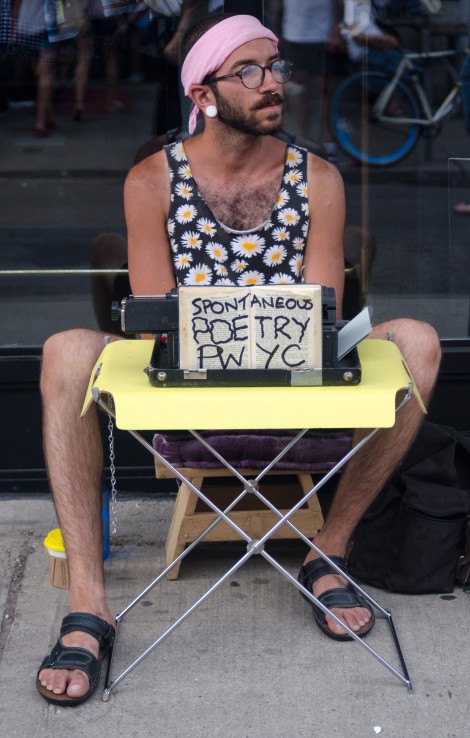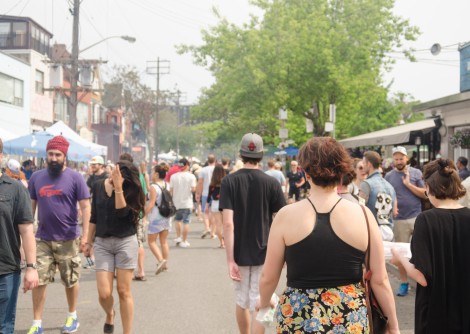A rickshaw parades down Baldwin Street. In it sits the recently crowned ‘Queen of the Sun,’ complete with a sceptre and robe. Merchants and bystanders cheer her on, then she begins bawling, overwhelmed with emotion.
“I came to Kensington Market to buy a broom!” she says.
The woman had just won a game of musical chairs during a Pedestrian Sunday in Kensington Market (PSK).
In its thirteenth season, PSK closes certain streets off to automobiles on the last Sunday of each month from May to October. Vendors, street performers, and artists take to the streets instead.
Volunteer coordinator Danielle Sebastian calls the festive day quirky and eclectic – exactly in line with how many people think of Kensington. Founder Shamez Amlani summed it up with its three catchwords: community, culture, and ecology. PSK also differs from other city events because it runs on a “shoestring” budget funded by the Kensington Market Business Improvement Area (BIA), with no corporate sponsorship.
Traditions of tolerance
The community feeling is evident as several people recognize Patrick Morrison, PSK organizer and coordinator of the Kensington Market BIA. They greet him throughout our interview at Café Pamenar, a popular spot among Kensingtonians. In charge of programming for PSK, Morrison aims to reflect the cultural diversity of Kensington and Toronto in general.
“Before I came on, there were just a bunch of lousy rock bands all the time,” Morrison says. “I try to bring in folk musicians from Bulgaria or folk dance groups from Belgium, or if you knew a group of 20 old Chinese men who rocked out on the erhu, I want to meet them and I want to feature them.”
[pullquote-image]

ANN CHANG/THE VARSITY
[/pullquote-image]
The market has a long history of diversity due to its tradition of welcoming new immigrants. As Morrison puts it, the one thing Kensington does not tolerate is intolerance.
“Even today, without thinking of this interview, I did a post on my Instagram of a woman who owns this Tibetan business,” Patrick says. “I saw her yesterday wearing traditional Tibetan clothes and I was like, that looks beautiful. I took a picture, I learned a little bit about it, and I talked in that post about how it’s great that we have people honouring their cultures and traditions, while at the same time celebrating those of their neighbours.”
After our interview, Morrison pauses to take a shot of the blossoms on a tree nearby, and the couple next to us jokes about getting the perfect Instagram shot. I am impressed by how easily Patrick conducts himself around the neighbourhood, turning to chat with the couple about the Instagram update and telling them to follow the Kensington BIA on Instagram.
Morrison works hard for PSK, but the work is rewarding for him too — although he jokes that he is underpaid. Today, he is busy preparing for PSK and fielding phone calls from The Globe and Mail regarding dispensaries in Kensington. I ask him about his favourite event at PSK.
“Sometimes it’s as simple as watching children playing in the street outside dancing days on Kensington Avenue,” Morrison says. “There is a bubble machine, there might be some form of music coming from somewhere on the street and just kids playing and having a good time in the streets safely. That’s the biggest one that pulls on my heartstrings and helps me keep going through all the ridiculousness that I have to go through to pull this event off.”
Behind the businesses
We walk to Wanda’s Pie in the Sky to meet David Beaver, Wanda’s husband who is commonly referred to as ‘Mr. Wanda.’ Beaver offers us free slices of cake in honour of Wanda’s birthday and clues me into the business side of Kensington.
“We try to incorporate the business and the community, which is a very unusual situation in Toronto, simply because this is such a great little enclave,” Beaver says. “I call it the heart of Toronto. That little jewel in the centre of Toronto. Once you recognize and figure out what a great place it is, you want to come here all the time.”
There are differing views on whether or not PSK is good for business. Restaurants tend to do better than furniture stores or bookstores. A few business owners argue Pedestrian Sundays draw in people who are only interested in looking and do not actually purchase anything.
“We don’t sell an awful lot during our time because usually a lot of the regulars kind of stay away. But for the tourists and a lot of people coming in from outside of the market – they come, they buy a cookie or two, go outside to listen to the band, wander around,” Beaver says. “We have a good time.”
[pullquote-image]

ANN CHANG/THE VARSITY
[/pullquote-image]
From Wanda’s, Morrison takes me to Segovia Meats. The shop has been in the market since 1978 and has participated in every PSK since its inception. I manage to squeeze in a three-minute interview with Leonardo Segovia, whose experience differs from David’s, although he agrees PSK is a fun time for many people.
“Obviously the financial part is great… we were able to take advantage of the opportunity to make some extra money during the summer,” Segovia says. “The market is very difficult and very hard in the winter, so this helps us recuperate some of the loss most stores have in the winter.”
Origins of activism
Later that month, I attend a PSK volunteer orientation, where I finally meet Shamez Amlani and a few other volunteers. At Café Pamenar, he fills me in on PSK history.
In 2002, Amlani and some of his friends came up with the idea of hosting a fun anti-car action. They took parking spots and fed the meters, encouraging others to do the same with their vehicles as well – roller blades and bicycles – still displaying their tickets as they would in a car.
“In each different parking spot, we had a different activity. In one of them, it was a hot summer day, and I was giving away free gazpacho,” Amlani says. “In another one, we had free bike repairs. In yet another parking spot, musicians came and they were playing music.”
After a few one-off events and plenty of community consultations, the first season of Pedestrian Sundays finally began in 2004. Without being didactic, the founders hoped PSK would have a consciousness-raising element for the city.
[pullquote-features]We need to rethink years of poor planning and letting cars take over everything in North American cities, in order to have healthy cities, bodies, and souls.[/pullquote-features]
“For example, we teamed up with the Atmosphere Chemistry department at the University of Toronto, and a professor there had created this fantastic pollution measuring device,” Amlani says.
Despite its agenda of raising awareness about what Amlani calls the “motorized apocalypse,” PSK events always keep a fun element as well.
“We [once] had a car that was a petition car,” Amlani says. “We painted it white and on the hood, we made a declaration asking for better public transit and cycling infrastructure and asking for the end of the reign of the automobile on our city streets. We got 10,000 signatures on this car and we invited politicians to come out and kind of debate. We put capes on them and said, ‘We count on you. You are supposed to be superheroes for us.’”
According to Amlani, we need to rethink years of poor planning and letting cars take over everything in North American cities, in order to have healthy cities, bodies, and souls. In addition to fighting car culture, Amlani supports small businesses and the “spirit of entrepreneurship” over “giant soulless greedy corporations,” which PSK programming reflects.
“What we like to do at Pedestrian Sundays is removing that line between audience and performer,” Amlani says. “Removing that line between consumer and creator and allowing people to explore their own sense of creativity and engaging people to talk and give their input to the world around them as well and to be more involved with what is going on in their surroundings.”
People make it possible
One involved person is recent U of T graduate Chris Gomez, who has volunteered for three seasons of PSK. We meet at Kruger Hall, where Gomez says that many of his friends have been scared off from volunteering because they liken it to the free labour given in unpaid internships.
Gomez disagrees with this, saying no one at PSK is taking advantage of volunteers. Instead, he likens volunteering to attending a house party with “all good stuff you will never see anywhere else” and less trash.
“[It] just starts with, I guess, a menial, small amount of equipment and that is what lets it get packed up so quickly,” Chris says. “As opposed to if you brought in all these stages and giant megaphones and giant parade floats – those would take a hundred years. I mean, the Santa Claus parade – who would know an old man would paralyze a whole city?”

Poet in Kensington Market. ANN CHANG/THE VARSITY
“I could spit right now and it would be on Augusta,” Gomez says. “All these students go there all the time and enjoy their time which is great, we want that to happen, and we also want them to enjoy PSK, but I think one thing they don’t realize they would also enjoy is volunteering and helping out. They won’t even feel like they are working. You want to work? Go somewhere that will get you paid.”
When I ask Gomez about his best and worst experiences volunteering, he has the same answer to both questions. Last May’s PSK was cold and rainy, but volunteers took turns relieving each other and a local shopkeeper offered them tea and gloves.
Gomez calls nature the “biggest equalizer” for participants at PSK because the festivities continue rain or shine.
“I’ve seen businesses in the area see people standing around the tango lessons that are going on in the hot sun,” Gomez says. “Businesses in the area that have patios –they will actually sacrifice money they could make by keeping their own chairs on their patio to actually give it to people that are waiting, or wanting to watch the tango. Those are dedicated people.”
I also talk to Sebastian about volunteering, at none other than Café Pamenar. For her, volunteering is a great opportunity to meet new people organically, without the social pressures that come with a work environment or a date.
“It’s like you’re building something together, as opposed to just one person focused like, ‘I have a task to do, I’m going to go out and do it,’ and then you both go to point B, and you don’t interact with anyone because it might get in your way of getting your point B thing done,” Sebastian says.
She claims that not only are volunteers good people, but that PSK attracts good people hoping to build a better community.
“Would people be interacting in Kensington if it wasn’t there, if this wasn’t happening?” Sebastian asks. “The amount of performers and the art fair alone. It’s so many artists. People wouldn’t get to be exposed to that because people wouldn’t get to perform. I am all for giving people a space to do that. I don’t see how people can be against that.”
[pullquote-image]

ANN CHANG/THE VARSITY
[/pullquote-image]
Amlani’s founding anti-car group said streets are for people. Given that Pedestrian Sundays are going strong, they may be proved right.
At the end of the month I attend the May PSK event, buying myself the shrimp kebab Gomez mentioned in our interview. There is a ballet going on in the park, a didgeridoo on one corner, and a May Pole at the very end.
Morrison eloquently sums it up: “Our cities are for people, our cities aren’t for cars. Cars don’t live; people live. It’s about having a better, more liveable city — better quality of life. Part of that is enjoying our streets.”
Looking around, that is exactly what people are doing.


